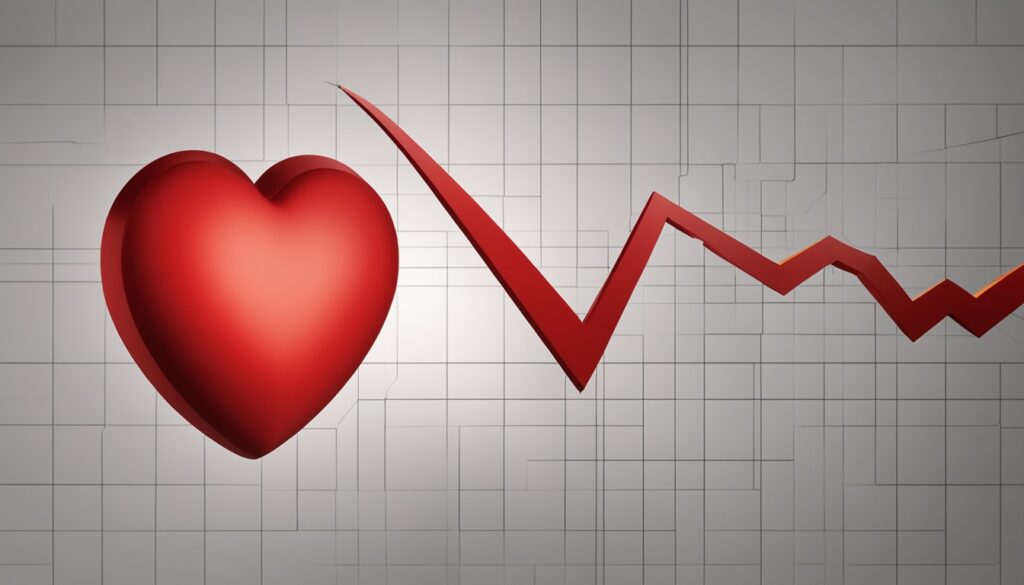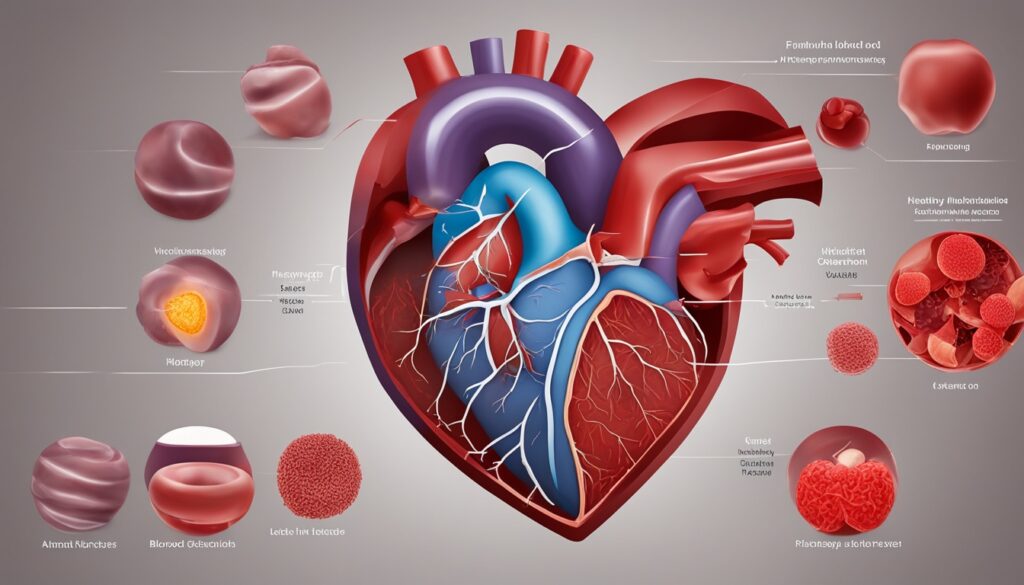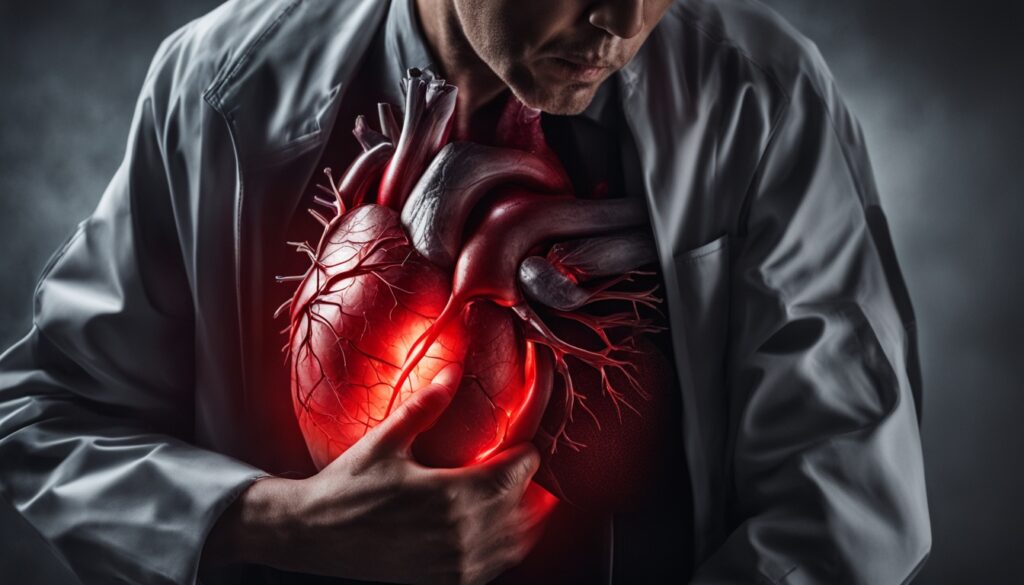Cholesterol is a vital substance in the blood that helps build healthy cells. But, having too much cholesterol can be bad for your heart. High levels can cause fatty deposits to build up in the arteries.
This buildup, called plaque, can make the arteries narrow and hard. This reduces blood flow and can lead to serious problems like chest pain, heart attack, and stroke.
It’s important to know how cholesterol affects your heart health. By understanding the different types of cholesterol and their roles, you can take steps to keep your levels in check. This helps protect your heart.
Key Takeaways : Cholesterol Affects Your Heart Health
- Cholesterol is a waxy substance essential for building healthy cells, but high levels can increase the risk of heart disease.
- High cholesterol can contribute to the buildup of plaque in the arteries, narrowing and hardening them, reducing blood flow.
- Understanding the impact of cholesterol on heart health is crucial for managing and preventing high cholesterol levels.
- Identifying risk factors and taking proactive steps can help maintain healthy cholesterol levels and reduce the risk of cardiovascular complications.
- Monitoring cholesterol levels and working with a healthcare provider to maintain a balanced cholesterol profile is essential for heart health.
What is Cholesterol and Its Role in the Body?
Cholesterol is a vital fat that plays a key role in our bodies. It moves through our blood with proteins called lipoproteins. Knowing about the different cholesterol types and their roles helps keep us healthy.
Types of Cholesterol: LDL and HDL
There are two main cholesterol types: LDL and HDL. LDL, or “bad” cholesterol, carries cholesterol around and can lead to artery blockages. HDL, or “good” cholesterol, helps clear out extra cholesterol from our bodies.
Importance of Cholesterol in the Body
Cholesterol is crucial for our bodies to work right. It helps make hormones, vitamin D, and bile acids for digestion. But, having too much or too little cholesterol can affect our heart health. Keeping LDL and HDL cholesterol in balance is key for staying healthy.
“Cholesterol is a necessary component of the body, but it’s important to keep it in balance to maintain good health.”
Cholesterol Affects Your Heart Health

High cholesterol, especially the bad kind (LDL), can harm your heart. It can build up in your arteries, making them narrow and hard. This is called atherosclerosis. It can cut down blood flow and raise the risk of heart diseases.
When arteries get blocked, your heart works harder to move blood. This can cause more problems, like:
- Coronary artery disease, which can cause chest pain, shortness of breath, and even heart attacks
- Increased risk of stroke, as the plaque can break off and block blood flow to the brain
- Heart failure, as the overworked heart muscle becomes weaker and less efficient
The impact of high cholesterol on cardiovascular disease is clear. Keeping your cholesterol in check is key for how cholesterol affects heart health. Knowing how cholesterol and heart health are linked helps you manage your cholesterol and lower your risk of heart problems.
“High cholesterol levels are a major risk factor for heart disease, the leading cause of death worldwide. Controlling cholesterol is crucial for maintaining a healthy heart and cardiovascular system.”
| Condition | Impact of High Cholesterol |
|---|---|
| Coronary Artery Disease | Plaque buildup in the arteries can restrict blood flow to the heart, leading to chest pain, shortness of breath, and increased risk of heart attack. |
| Stroke | Plaque can break off and block blood flow to the brain, causing a stroke. |
| Heart Failure | The overworked heart muscle becomes weaker and less efficient, leading to heart failure. |
Risk Factors for High Cholesterol

Keeping your cholesterol levels healthy is key for a strong heart. Many things can make your cholesterol go up. Knowing what these are helps you fight them and stay healthy.
Lifestyle Factors
Eating too much bad fat and not moving enough can raise your cholesterol. Eating lots of fruits, veggies, whole grains, and lean meats helps. Also, staying active and quitting smoking is good for your heart.
Medical Conditions
Some health issues like diabetes, hypothyroidism, and chronic kidney disease can affect your cholesterol. If you have these, you might need closer watch and treatment to keep your heart healthy.
Genetic Factors
Your genes can affect how your body handles cholesterol. Some people might naturally make more cholesterol or have trouble getting rid of it. This can up your risk of high cholesterol. Checking your family history is key to understanding your risk.
| Risk Factor | Description |
|---|---|
| Unhealthy Diet | A diet high in saturated and trans fats can increase LDL (bad) cholesterol levels. |
| Sedentary Lifestyle | Lack of physical activity can contribute to weight gain and reduced HDL (good) cholesterol levels. |
| Smoking | Smoking can lower HDL (good) cholesterol and increase the risk of heart disease. |
| Diabetes | Diabetes can lead to an increase in LDL (bad) cholesterol and a decrease in HDL (good) cholesterol. |
| Hypothyroidism | Hypothyroidism can cause an increase in LDL (bad) cholesterol levels. |
| Chronic Kidney Disease | Chronic kidney disease can contribute to an imbalance in cholesterol levels. |
| Genetic Predisposition | Certain genetic factors can lead to an increased production or decreased removal of cholesterol from the body. |
Knowing what can raise your cholesterol lets you take steps to keep it in check. You can change your lifestyle or get medical help to keep your heart healthy.
Complications of High Cholesterol

High cholesterol without proper management can cause serious health issues. A big worry is the buildup of plaque in arteries, known as atherosclerosis. This can block blood flow, raising the risk of heart and blood vessel diseases.
High cholesterol is a major risk for coronary artery disease. This can lead to chest pain and even heart attacks. It also increases the chance of carotid artery disease, causing strokes and mini-strokes.
High cholesterol can also lead to peripheral artery disease. This makes leg pain worse and cuts down blood flow to the feet and hands. It greatly affects a person’s daily life and how they move around.
High cholesterol is also linked to high blood pressure. High cholesterol puts more strain on the heart and blood vessels, making blood pressure go up. This raises the risk of heart disease and other health issues even more.
| Complication | Description |
|---|---|
| Coronary Artery Disease | Plaque buildup in the arteries leading to chest pain and heart attacks |
| Carotid Artery Disease | Plaque buildup in the carotid arteries leading to strokes and TIAs |
| Peripheral Artery Disease | Plaque buildup in the peripheral arteries leading to leg pain and reduced blood flow |
| High Blood Pressure | Increased strain on the cardiovascular system due to high cholesterol levels |
It’s very important to manage high cholesterol to avoid these serious health problems. Making lifestyle changes and getting medical help can prevent the bad effects of high cholesterol.
High cholesterol without control can cause serious health issues like heart and blood vessel diseases. It’s key to tackle these risks with lifestyle changes and medical help to keep the heart healthy.
Prevention and Management of High Cholesterol

Keeping your heart healthy is key, and you can prevent and manage high cholesterol with lifestyle changes and sometimes medication. By making a few simple changes, you can help prevent and manage high cholesterol effectively.
Lifestyle Changes for Cholesterol
Changing your lifestyle is a great way to prevent and manage high cholesterol. Here are some tips:
- Eat a diet low in saturated and trans fats
- Stay active with activities like walking, swimming, or cycling
- Keep a healthy weight
- Don’t smoke or avoid secondhand smoke
Cholesterol-Lowering Medications
If your cholesterol is still high, your doctor might suggest cholesterol-lowering medications, like statins. These drugs can lower your risk of heart problems by managing your cholesterol.
Getting regular cholesterol checks and working with your healthcare team is key to preventing and managing high cholesterol. By being proactive and making smart choices, you can improve your heart health and lower your risk of future problems.
| Lifestyle Changes | Cholesterol-Lowering Medications |
|---|---|
|
|
“Taking an active role in managing your cholesterol can significantly reduce your risk of heart disease and other serious health complications.”
Also Read : Why You Should Consider Reducing Sugar For Health
Conclusion
Cholesterol is important for the body, but too much can harm the heart. Knowing about cholesterol types, risk factors, and complications helps people manage their levels. This can lower the risk of heart disease.
By making healthy choices like eating right and exercising, people can keep their cholesterol in check. Sometimes, medical help is also needed. Taking care of cholesterol and heart health can lead to a healthier life.
Keeping your cholesterol and heart healthy requires a full approach. This includes learning, making lifestyle changes, and getting medical advice when needed. By being informed and taking action, people can improve their cholesterol and heart health. This leads to a better and more active future.
FAQs
Q. What is cholesterol?
Cholesterol is a waxy substance in our blood. It’s vital for making healthy cells. But, too much cholesterol can be bad. It can lead to fatty deposits in the arteries.
Q. What are the different types of cholesterol?
There are two main cholesterol types: LDL and HDL. LDL is the “bad” cholesterol. HDL is the “good” one.
LDL carries cholesterol around the body. It can make plaque in arteries. HDL helps clear out extra cholesterol from the body.
Q. How does cholesterol affect heart health?
High LDL cholesterol can cause plaque to build up in arteries. This is called atherosclerosis. The plaque can make arteries narrow and hard.
This can reduce blood flow. It raises the risk of heart problems like heart attack and stroke.
Q. What are the risk factors for high cholesterol?
High cholesterol is linked to an unhealthy diet, not moving enough, and smoking. Conditions like diabetes and kidney disease can also raise your risk. Your genes play a big part too.
Q. What are the potential complications of high cholesterol?
High cholesterol can cause serious issues. These include heart and artery diseases. It also raises the risk of heart attack and stroke.
Q. How can high cholesterol be prevented and managed?
You can prevent and manage high cholesterol with lifestyle changes. Eating right, staying active, and quitting smoking helps. Sometimes, you might need cholesterol-lowering drugs.
Source Links
- https://www.cdc.gov/cholesterol/about/index.html
- https://my.clevelandclinic.org/health/articles/11918-cholesterol-high-cholesterol-diseases
- https://www.mayoclinic.org/diseases-conditions/high-blood-cholesterol/symptoms-causes/syc-20350800








Leave A Comment